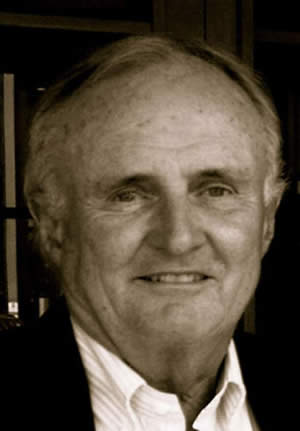This book review, written by Frederick Smock, appeared in the Louisville Courier Journal on May 27, 2011
 I write to you with exciting news — here is a major talent, a short story writer who, in this debut collection, vaults into the first ranks.
I write to you with exciting news — here is a major talent, a short story writer who, in this debut collection, vaults into the first ranks.
I am tempted to compare Daly Walker to Tim O'Brien, for his soulful stories about the war in Vietnam, or to doctor-author Walker Percy, for his precise figuration of the human condition and his fine portrayals of doctors with patients.
Daly Walker is, in fact, a surgeon, now retired. He served in Vietnam as a battalion surgeon and earned a Bronze Star. A fellow of the American College of Surgery, he practiced for 35 years in Columbus, Ind. He has also studied creative writing at Indiana University and the University of Louisville. As well, he has studied with Sena Jeter Naslund, the founding director of the local Fleur-de-Lis press, housed at Spalding University, which specializes in publishing the first books of local authors.
Walker's scrupulous and unflinching attention to detail — in his story “I Am the Grass,” for example, which was first published in The Atlantic Monthly — calls to mind Tim O'Brien's marvelous stories in “The Things They Carried.” Walker's story begins:
“Because I love my wife and daughter and because I want them to believe I am a good man, I have never talked about my year as a grunt with the 25th Infantry in Vietnam. … I cannot tell my wife who paints watercolors of song birds that on a search and destroy mission I emptied my M60 machine gun into two beautiful white egrets that were wading in the muddy water of a rice paddy. I cannot tell them how I sang ‘Happy Trails' as I shoved two wounded Viet Cong out the door of a medevac chopper hovering twenty feet above the tarmac. …”
I am most tempted, however, to say that Walker reminds me — and in a wholly original way — of James Salter, a writer's writer, whose short stories are spare and crisp and achingly beautiful. Like Salter, Walker's gesture are slight yet emphatic. His characters are quickly sketched yet endearing and memorable. He does a lot in few words. And he is subtle.
In his story “Widow's Walk,” a doctor living on the beach sees a fetching woman walking along with her dog at dusk, tossing it tennis balls in the surf. He strikes up a conversation, enticing her to linger with a story about the green flash just at sunset, but she begs off.
“I watched her as she moved away down the beach with the dog at her side. … I turned and looked out to sea. I watched the sun on its lonely descent, wondering, desiring. From a distance came the piercing cry of an osprey. Suddenly the orange orb dropped from sight. No green light flashed in the sky.”
No green light for him. It turns out that the woman is married, and her husband is suffering from terminal cancer. The good doctor ends up treating him, warmly and compassionately. When the husband dies, his ashes are sprinkled over the pass where the tarpon swim, where he had fished as a boy. The story ends with this lovely scene:
“We walked slowly to the water's edge. We stood in the sand with Lilly at Judy's feet. … As if searching for something lost at sea, we watched the sun sink below the horizon. The afterglow was a soft lavender that seemed more like daybreak than twilight. I put my arm around her, and she leaned against me. In the pass, tarpon were
rolling. Their great silver bodies arched, gleaming in the dying light.”
This is as pleasurable a book of short stories as I have read in years, in fact, since reading Salter's “Last Night.” Other stories from this collection have appeared in The Sewanee Review, The Louisville Review and The Southampton Review. Walker has also been short-listed for an O. Henry Award.
Frederick Smock teaches at Bellarmine University. His forthcoming book of poems is “The Deer at Gethsemani: Eclogues” (Accents Publishing.)